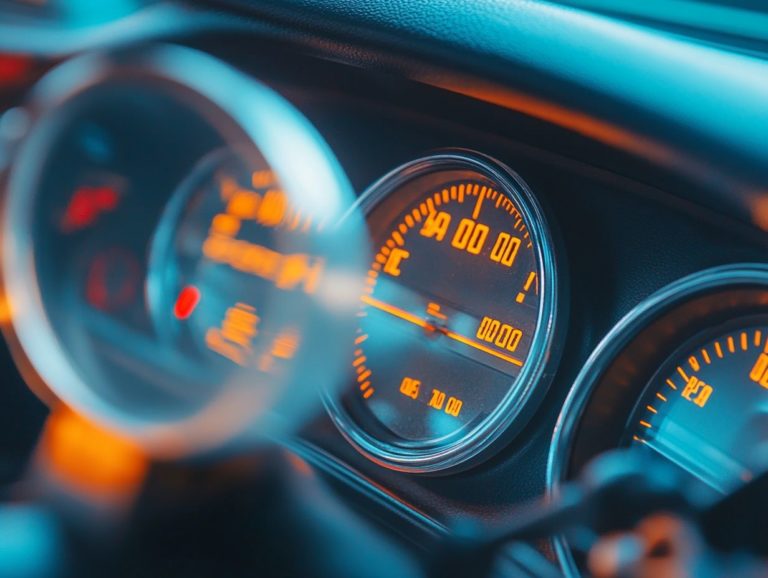How to Analyze a Used Car’s Fuel Economy
When you’re in the market for a used car, fuel economy frequently tops the list of your priorities. Comprehending terms such as MPG and MPGe is crucial for making informed decisions, but that s merely the starting point.
This guide delves into the key factors influencing fuel efficiency, offers insightful tips for evaluating a vehicle s performance, and shares expert advice on enhancing your car’s gas mileage.
Whether you re a novice navigating the process or a seasoned buyer looking to refine your strategy, this article empowers you with the knowledge necessary to make a wise choice.
Contents
- Key Takeaways:
- Understanding Fuel Economy Ratings
- Assessing a Used Car’s Fuel Economy
- Boost Your Fuel Economy Today!
- Factors to Consider When Purchasing a Used Car for Fuel Efficiency
- Preguntas Frecuentes
- 1. Qu es la econom a de combustible y por qu es importante al analizar un coche usado?
- 2. C mo puedo determinar la eficiencia de combustible de un coche usado?
- 3. Hay otros factores que pueden afectar la econom a de combustible de un coche usado?
- 4. Puedo confiar en la eficiencia de combustible anunciada de un coche usado?
- 5. Hay alguna forma de mejorar la econom a de combustible de un coche usado?
- 6. Puedo negociar el precio de un coche usado basado en su econom a de combustible?
Key Takeaways:

- Understand the meaning of MPG (Miles Per Gallon) and MPGe (Miles Per Gallon Equivalent) ratings to accurately compare the fuel economy of used cars.
- Research the vehicle’s official fuel economy ratings and consider real-world driving conditions to make an informed decision.
- Proper maintenance and driving habits play a crucial role in improving the fuel efficiency of a used car.
- Consider factors such as vehicle type, size, engine type, and fuel type when purchasing for fuel efficiency.
Understanding Fuel Economy Ratings
Understanding fuel economy ratings is crucial for a vehicle buyer, especially if you’re in Boise and aiming to maximize your savings on gas while minimizing your carbon footprint.
Fuel efficiency goes beyond mere numbers; it involves a variety of metrics, including Miles Per Gallon (MPG) ratings and Energy Efficiency ratios, all of which can significantly enhance your overall driving experience.
By comprehending these ratings, you can make informed choices about fuel-efficient cars. Whether you’re considering hybrid models or traditional internal combustion engines, these ratings are influenced by factors like engine size and vehicle condition.
What Do MPG and MPGe Mean?
MPG, or Miles Per Gallon, is a crucial metric that allows you to evaluate the fuel consumption of traditional vehicles. In contrast, MPGe, or Miles Per Gallon Equivalent, measures the fuel efficiency of electric vehicles. This metric provides a standardized way to compare fuel efficiency across various vehicles, including clean diesel and hybrids.
Grasping these metrics is vital if you want to make informed decisions about your vehicle choices. For instance, a gasoline vehicle with an MPG rating of 30 uses roughly one gallon of fuel to travel 30 miles. An electric vehicle rated at 100 MPGe can cover the same distance using the electricity equivalent of one gallon of gasoline.
Keep in mind that factors such as engine size, weight, and your unique driving habits can significantly impact MPG or MPGe ratings. Stop-and-go traffic can reduce MPG in gasoline vehicles, while electric vehicles may deliver variable performance depending on charging habits and battery efficiency.
Understanding these distinctions equips you to better assess your needs and select vehicles that truly fit your lifestyle.
Factors Affecting Fuel Economy
Several factors can greatly influence your fuel economy, from your driving habits to vehicle maintenance and the conditions you encounter on the road. These elements can lead to significant variations in fuel consumption, regardless of whether you’re driving a fuel-efficient used car or a brand-new model.
Aggressive acceleration and sudden braking not only put extra strain on your engine but also result in more frequent fuel consumption, ultimately diminishing your overall efficiency.
Embracing smoother driving strategies can yield remarkable improvements in your mileage. Regular vehicle maintenance is equally essential; a well-maintained engine performs at its best, supporting better fuel economy.
Simple tasks, like routine oil changes and keeping your tires properly inflated, can make a difference in reducing unnecessary carbon emissions. When you consider these factors together, it s clear how your driving behavior and vehicle upkeep significantly impact your carbon footprint.
Adopting habits that are both economically savvy and environmentally friendly not only benefits your wallet but also contributes to a healthier planet.
Assessing a Used Car’s Fuel Economy
When evaluating a used car’s fuel economy, consider key factors that impact fuel efficiency to maximize your savings. For detailed insights, learn how to assess fuel economy, including MPG ratings, the overall condition of the vehicle, and its maintenance history.
Each of these elements can greatly impact your potential savings on gas throughout the car’s lifespan, especially if you’re a buyer in Boise searching for fuel-efficient options.
Don t delay routine maintenance; it can boost your fuel efficiency and save you money. Start your search for a fuel-efficient car today!
Researching the Vehicle’s MPG and MPGe Ratings

Researching a vehicle’s Miles Per Gallon (MPG) and Miles Per Gallon equivalent (MPGe) ratings is essential for you as a potential buyer. These ratings offer valuable insights into fuel consumption and efficiency, often validated by the rigorous testing standards established by the EPA.
Utilizing the EPA’s fuel economy guide allows you to access a wealth of information on various models, including city and highway ratings that showcase how different vehicles perform in real-world driving scenarios.
Carefully examining these figures is vital, as they can significantly impact your long-term expenses, such as gasoline costs and your overall environmental footprint.
For many buyers, understanding how these ratings stack up against one another is crucial in making an informed purchasing decision. This ensures you select a vehicle that aligns with both your performance expectations and budgetary constraints.
Considering Real-World Driving Conditions
When assessing a vehicle’s fuel economy, it s crucial to consider real-world driving conditions. Factors like traffic patterns, whether you re navigating urban jungles or cruising through rural landscapes, and your personal driving habits can create gaps between EPA estimates and your actual experiences on the road.
For instance, in stop-and-go traffic, your vehicle is likely to suffer from lower fuel efficiency. The constant acceleration and deceleration strain the engine, resulting in higher fuel consumption.
Highway driving, on the other hand, tends to offer more consistent speeds, significantly enhancing efficiency and allowing your engine to perform at its best.
You might notice that your actual fuel usage often falls short of advertised benchmarks, especially in bustling urban areas where traffic signals and congestion disrupt smooth driving. Understanding how various driving environments affect fuel economy is essential for a fuller picture beyond controlled testing conditions.
Boost Your Fuel Economy Today!
Enhancing fuel economy isn t just a task for vehicle manufacturers; you have the power to make a substantial impact as well. Your wallet will thank you!
By implementing a range of strategies such as maintaining your vehicle properly and adopting fuel-efficient driving habits you can significantly boost your fuel efficiency.
These conscious efforts will benefit your vehicle and lead to impressive savings at the pump.
Maintaining the Vehicle Properly
Proper vehicle maintenance is key to achieving the best fuel efficiency. Regularly checking your tire pressure, changing the oil, and monitoring engine performance can significantly improve your MPG ratings and reduce fuel consumption, regardless of driving conditions.
Beyond these foundational tasks, examine the air filter and check the spark plugs, as they are vital for enhancing fuel economy. A clean air filter ensures your engine receives a sufficient supply of air, facilitating effective combustion. Well-functioning spark plugs ignite the fuel-air mixture efficiently, preventing misfires that lead to wasted fuel.
Focusing on these maintenance tasks helps you achieve better MPG ratings and a smoother, more cost-effective driving experience. Attention to these components not only helps you avoid unexpected breakdowns but also promotes a healthier engine in the long run.
Driving Habits that Impact Fuel Efficiency
Want to save money on gas? Here s how you can drive smarter! Adopting fuel-efficient driving habits can result in significant savings at the pump and enhance your overall fuel efficiency.
By making a few simple adjustments like accelerating smoothly from a stop and maintaining a consistent speed you can dramatically reduce your fuel consumption. Instead of racing off and abruptly hitting the brakes, try easing into the gas for a more gradual start. This approach not only promotes a smoother ride but also leads to lower fuel usage.
Keeping a steady speed can further amplify your efficiency. Utilizing cruise control on longer stretches can be particularly beneficial, as it helps maintain that consistent speed.
These minor tweaks, while they may seem insignificant, can yield noticeable improvements in how far you can travel on a single tank of gas.
Start implementing these tips today and watch your savings grow!
Factors to Consider When Purchasing a Used Car for Fuel Efficiency

When you re in the market for a used car focusing on fuel efficiency, it s essential to consider several key factors.
Pay attention to the vehicle type and size, as these significantly impact your overall fuel economy. The engine type also plays a crucial role in determining efficiency.
Don t overlook the importance of consulting a specific fuel economy guide; it can be your best resource for finding the most fuel-efficient cars that align with your needs and preferences.
Vehicle Type and Size
The type and size of your vehicle are essential factors in determining fuel economy. Typically, smaller vehicles are more fuel-efficient than larger SUVs, making them an appealing choice for eco-conscious buyers seeking fuel-saving options.
This trend becomes clear when comparing compact sedans to midsize SUVs; the latter often grapples with increased weight and air resistance. A subcompact car might achieve over 35 miles per gallon, while a full-size truck could struggle to hit 20 mpg under similar driving conditions.
Hybrid and electric vehicles are gaining recognition for their remarkable efficiency, frequently outperforming traditional gasoline-powered options. By opting for smaller, lighter vehicles, you not only reduce fuel costs but also contribute to lower emissions, positively impacting environmental sustainability.
Engine Type and Fuel Type
The type of engine and fuel you choose are pivotal factors when evaluating a vehicle’s fuel efficiency. Clean diesel and hybrid vehicles often outshine traditional gasoline engines, making them appealing choices for those seeking fuel-efficient used cars.
Understanding the differences between these technologies can significantly influence your decisions if you’re looking to save money at the pump.
Hybrid vehicles harness both gasoline and electric power, optimizing energy consumption and minimizing emissions. This clever combination allows them to achieve impressive miles per gallon (MPG), often outpacing purely gasoline-powered counterparts.
On the other hand, clean diesel engines maximize torque while reducing fuel consumption, offering distinct advantages, especially for long-distance travel.
By weighing the benefits of these various engine types against your driving habits, you can confidently choose the best car for you that aligns with your budget and environmental aspirations.
Preguntas Frecuentes
1. Qu es la econom a de combustible y por qu es importante al analizar un coche usado?
La econom a de combustible se refiere a la cantidad de combustible que un veh culo consume en relaci n con la distancia que recorre. Es importante analizar la econom a de combustible de un coche usado porque puede afectar en gran medida el costo total de propiedad y tambi n puede indicar la salud y el rendimiento general del veh culo.
2. C mo puedo determinar la eficiencia de combustible de un coche usado?

La forma m s com n de determinar la eficiencia de combustible de un coche usado es observar su millaje estimado por la EPA, que se basa en pruebas estandarizadas. Tambi n puedes calcular el promedio de millas por gal n (MPG) del coche utilizando la cantidad de combustible que consume y la distancia que recorre.
3. Hay otros factores que pueden afectar la econom a de combustible de un coche usado?
S , hay varios otros factores que pueden impactar la econom a de combustible de un coche usado, como la edad del veh culo, su condici n, los h bitos de conducci n y el historial de mantenimiento. Los veh culos m s grandes y pesados, as como aquellos con motores m s potentes, tienden a tener una menor eficiencia de combustible.
4. Puedo confiar en la eficiencia de combustible anunciada de un coche usado?
El millaje estimado por la EPA es un buen indicador, pero no siempre refleja la conducci n real. Factores como el clima, el tr fico y tu estilo de conducci n pueden afectar la econom a de combustible.
Investiga y prueba el coche. As , entender s mejor su eficiencia de combustible.
5. Hay alguna forma de mejorar la econom a de combustible de un coche usado?
Puedes mejorar la econom a de combustible de un coche usado con mantenimiento regular. Inflar los neum ticos correctamente y evitar la conducci n agresiva tambi n ayuda.
Hazlo ahora y ahorra dinero en gasolina! Considera agregar aparatos que ayudan a ahorrar gasolina o cambiar a neum ticos m s eficientes.
6. Puedo negociar el precio de un coche usado basado en su econom a de combustible?
Puedes usar la econom a de combustible como herramienta de negociaci n al hablar del precio. Un coche que consume m s gasolina puede costarte m s en el futuro.
Es razonable pedir un precio m s bajo o que el vendedor solucione cualquier problema que afecte la eficiencia.






